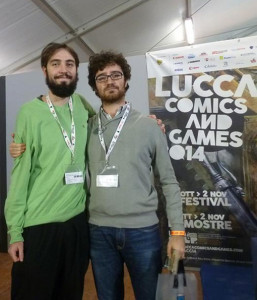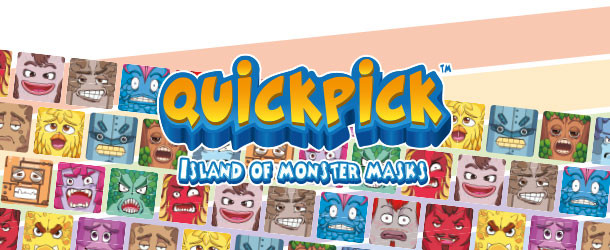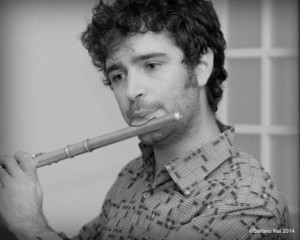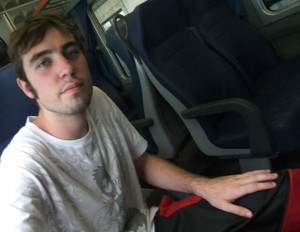A funny and original game for players of all ages, Quickpick - The Island of Monster Masks was pre-released at Spiel 2015, in Essen, and will soon be in full distribution. With innovative gameplay based on choosing and taking actions quickly, and using different perception skills, Quickpick was created by two young Italian game designers, Benedetto Degli Innocenti, 27 years old, and Martino Chiacchiera, 22. This is the second game they developed in partnership, following MoodX, in 2014.
Benedetto works as graphic designer and technology trainer for inmates. He studied Cinema Engineering and Family Business Mediation. Besides board games, he has also designed children’s apps and digital fairytales for Jekolab. He is a member of an electronic/fusion music project called Pop James. Martino works as editor for dV Giochi, an Italian board game publisher, and studies Science and Biology at university. He has designed board games for different companies, including a game for the European Commission as part of a campaign against gambling. In his free time, he has many interests, from good sci-fi films and the One Piece series, to ragtime music and basketball.

Martino Chiacchiera and Benedetto Degli Innocenti, the authors of Quickpick. (photo by Gioconomicon).
In this interview, we find out a bit more about them while waiting for Quickpick to arrive on the shelves.
Ares Games (Ares): When did you start playing board games? Which were your first, favorite games at the time?
Benedetto Degli Innocenti (BI): My first modern board game was Settlers of Catan! I played hundreds and hundreds of matches, with my house mates during my university years. I was fascinated by the various game elements, like the random creation of the map, the balance solutions, etc. A while later, I bought Carcassonne, Zooloretto, Ticket to Ride, Dixit... and another 100 games.
Martino Chiacchiera (MC): I started when I was six, with Goose and other boring, old games. Then, I moved to TCG like Yu-gi-ho and Magic, finally finding modern Euro games when I was sixteen! But, my favorite game at that time was probably the videogame, Warcraft 3.
Ares: How did you start to design games? At which point did you decide to stop being "just" players and become game authors?
BI: After a series of terrible game designs, I developed a card game called "23.59 on 20 December 2012" for an Italian contest, Gioco Inedito, and it was among the finalists. It was great for me to test my game design knowledge and skills, and to confirm that I could continue to work in this creative world!
MC: I started to design games when I was seven, even if I was not aware of it, to bring some fun on Goose, the only game I knew at that time. Knowingly, I started when I was sixteen, and it led me to find BoardGameGeek, a ludothèque in my city, and all the modern board games I play nowadays. My first prototypes were really bad when compared to modern board games, but, thankfully, I have improved a little bit :-).
Ares: Are you full time game designers, or do you create your games as a hobby/part time job?
BI: Game design is a little part of my life, actually. It’s not my job, and I try to follow many passions. I play in a band called Pop James, I work as graphic designer for many projects, and I write for blogs about board games, among other activities.
MC: Currently, I'm attending my last year of university and have a part-time job as Junior Editor for dV Giochi, an Italian board game publisher. I hope to become a full time game designer and continue working for dV Giochi in the future.
Ares: What are the major references in your work – literature, movies, or games?
BI: I think that every creative product could be a good inspiration. A movie, an album, or a book could contain a little input for a game design idea.
MC: Inspiration is unpredictable; usually it comes from other games I play, or any sort of system or item I see or use in real life, or experiences I live such as a movie, a journey, a dialogue with a friend and so on.
Ares: How about your creative process? Do you start with a theme or with the mechanics?
BI: I try to start with a purpose, with an intention. I mean, I’d like players to achieve some specific potential, which is hard to express in real life. During a game, the player learns, (maybe without being aware), tells a story, recites, realizes the other players’ strategies, bluffs, etc. For me, this is the real interesting and often most fun aspect of a game.
MC: It depends. Most of the times I start with a mechanic, a particular component I want to use, or a standard component I want to use in a different and new way. Sometimes, I start from the theme or dynamic I want to engender among players.
Ares: You already worked together on another game, Mood X. How did you start this partnership, and how does it work?
BI: I met Martino during a game design workshop in Rome, and two months later we made MoodX – that was our first published board game! After that, we designed other games together, such as "Bibs," which was finalist in "Gioco inedito" contest at Lucca Comics & Games 2014, and "Quickpick," which became our second board game to be published!
MC: When we met the first time, we felt natural to cooperate. Usually Benedetto proposes working on a very specific idea, but he doesn't exactly define how to translate it in a game. If I like the idea, I try to put it in a game, and develop an early prototype that is fully playable. At this point, we start playtesting and discussing how to improve it. This is the "magic formula" that worked for my (and our) first two published board games!
Ares: How often do you play games? What kind of games are your favorite as players?
BI: I play every week, hopefully trying a new game every time. I prefer family games or gateway games. I don't like very complex games and "brainburners."
MC: I play games every week. I like party games and family games, but my favourites are Eurogames like Notre Dame, Carcassonne (as a 2-player game), Burgundy, and other German light strategy games.
Ares: Do you enjoy playing your own games after they are published?
BI: Yes, with my little niece!
MC: Yes, if I designed a game, I did it because I felt there wasn't a game and I wanted it! Anyway, I always prefer to playtest my next prototypes or new games I haven't played yet!
Ares: Looking to the games you have designed, do you have a favorite? Which one and why?
BI: My favorite game is an unpublished abstract game, which is like “Quarto.” It's very easy to learn, but it seems very complex to play well. Maybe I'll find a publisher for this little idea!
MC: Actually I stop loving my games as soon as they are published! I guess it is a subconscious method to push myself to design a new game as soon as possible. In this way, my favorite game is always the upcoming one.
Ares: Are you currently working in one or more new games? Can you talk about any upcoming project(s)?
BI: In this period, my game design activities are on hold, because I'm working for my band and our first album is almost ready!MC: I've designed several games that should be published in 2016, one designed with Benedetto, others designed with other co-authors or alone. Now I'm trying to improve on my design of Eurogames, something I like, but I find difficult.
Ares: Any advice for people wanting to become a game designer?
BI: The market has plenty of games set in fantasy/sci-fi universes or historical settings; however, there are too few games set in our present time. I would try more games with daring settings, though for new, different public targets... not only for nerds!
MC: First you need passion. When I started, I had no skills in game design. I had played a few games and I didn’t know modern board games. I was unable to figure out proper rules… it was a complete disaster! I studied a lot, questioned a lot, played a lot, read a lot, and learned a lot, although I still feel I have a lot to learn. Passion is what really drives me. If you have passion, then you only need time to improve your skills and experience in this awesome art.














